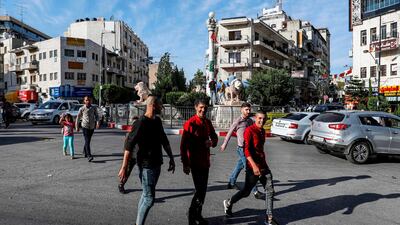The Palestinian economy is set to contract by at least 7.6 per cent this year and requires aid to help it deal with the impact of the coronavirus pandemic that may double the government's fiscal deficit to $1.5 billion (Dh5.5bn), the World Bank said.
Output in the West Bank and Gaza may shrink by as much as 11 per cent if the recovery is slower than anticipated or if there are further restrictions, the Washington-based lender said in a new report released on Monday. The economy grew a mere 1 per cent last year and the Covid-19 outbreak has exacerbated pressure on the finances of the Palestinian Authority.
Though the Palestinian Authority was quick to act in the wake of the pandemic "several years of declining donor support and the limited economic instruments available have turned the ability of the government to protect livelihoods into a monumental task," Kanthan Shankar, the World Bank's country director for the West Bank and Gaza said. "Hence, external support will be critical to help grow the economy during this unprecedented period."
Covid-19, which was declared a pandemic by the World Health Organisation at the end of January and has infected 448 people in the West Bank and Gaza, killed 3, with 372 recoveries, according to the Johns Hopkins University, which is tracking the pandemic globally.
There are now more than 6.1 million people infected globally by the virus, which disrupted global supply chains, brought the world economy to a standstill and decimated the air and travel industry.
Governments and central banks have rolled out more than $8 trillion in monetary and fiscal support to offset the impact of the pandemic on economies. The global economy is set to contract at least 3 per cent this year and slide into the deepest recession since the 1930s, according to the International Monetary Fund.
The coronavirus "continues to hit the [Palestinian] economy hard," the World Bank said. "Beyond the immediate crisis, lifting restrictions on the development of digital infrastructure and fostering better regulations could play an important role in stimulating an already faltering economy."
A decline in revenues and substantial increase in public spending on people’s medical, social and economic needs will strain the fiscal balance of the Palestinian Authority, the bank said.
"Even with reallocations of some expenditures, the financing gap could increase alarmingly, from an already high $800 million in 2019 to over $1.5bn in 2020 to adequately address these needs," the lender said.
More than a quarter of Palestinians lived below the poverty line before the pandemic and are now expected to increase to 30 per cent in the West Bank and 64 per cent in Gaza, according to the bank. Unemployment among the youth unemployment rate is estimated at 38 per cent, far above the regional average across the Middle East and North Africa.
The economy's potential remains confined by restrictions on the movement of people and goods but developing its digital infrastructure can help spur growth and create jobs, the lender said.
"With its tech-savvy young population, the potential is huge," Mr Shankar said. "However, Palestinians should be able to access resources similar to those of their neighbors’, and they should be able to rapidly develop their digital infrastructure as well."
The World Bank pointed to lack of progress on the telecommunications front as a case in point for the need to accelerate the uptake of technology in order for the economy to grow.
"At a time when other countries are contemplating the use of 5G, the Palestinian territories are among the last places in the Middle East to launch 3G in the West Bank and 2G in Gaza," the lender said.
The telecom operators are at a "competitive disadvantage, facing restrictions on access to spectrum, sites for network coverage and import of certain telecom equipment," it added. "They compete against operators who can offer unlicensed 4G/LTE services in the West Bank and 3G in Gaza for those in proximity to Israeli networks through pre-paid SIM cards."
The World Bank called for specific reforms to be made in collaboration with Israel, including: the revival of the Joint Telecommunications Committee to resolve bilateral issues, agreeing on a time-frame for the allocation of 4G spectrum and ultimately 5G, lifting restrictions on equipment needed to introduce new technologies, and mitigating the effect of unauthorised telecom activity in the Palestinian territories.
The lender called on the Palestinian Authority to develop a comprehensive strategy for the telecoms sector, which includes establishing an independent regulator and prioritising the passing of a new telecommunications law.
Donor support for the institutional development needed in the telecom sector and helping with financing schemes that can help mitigate political risks and increase private sector investment "is vital," the lender said.


